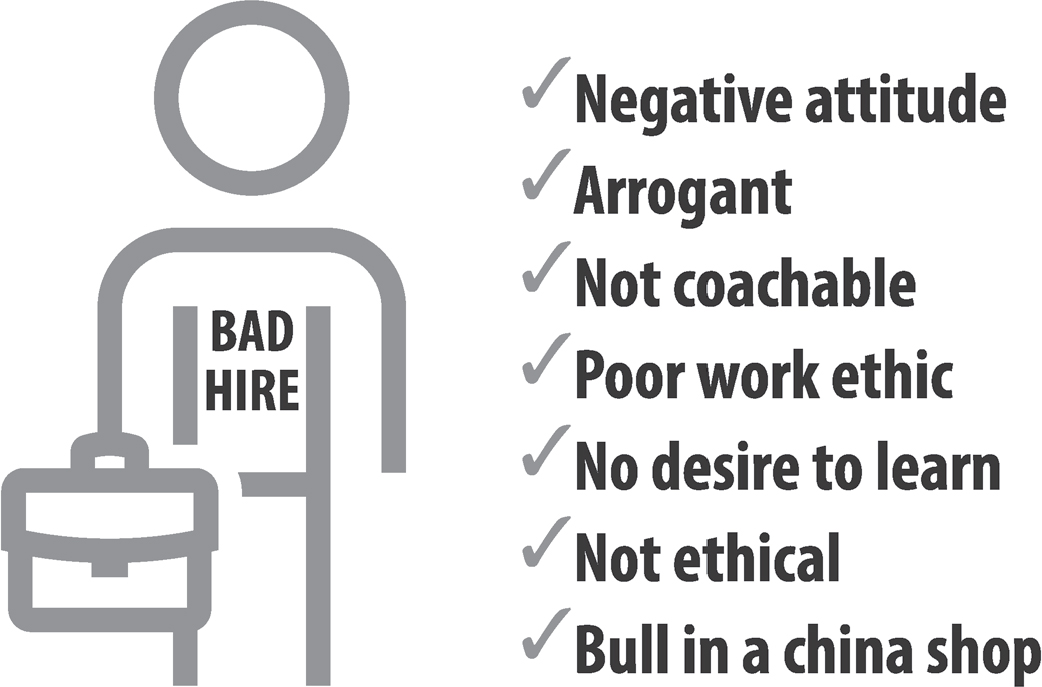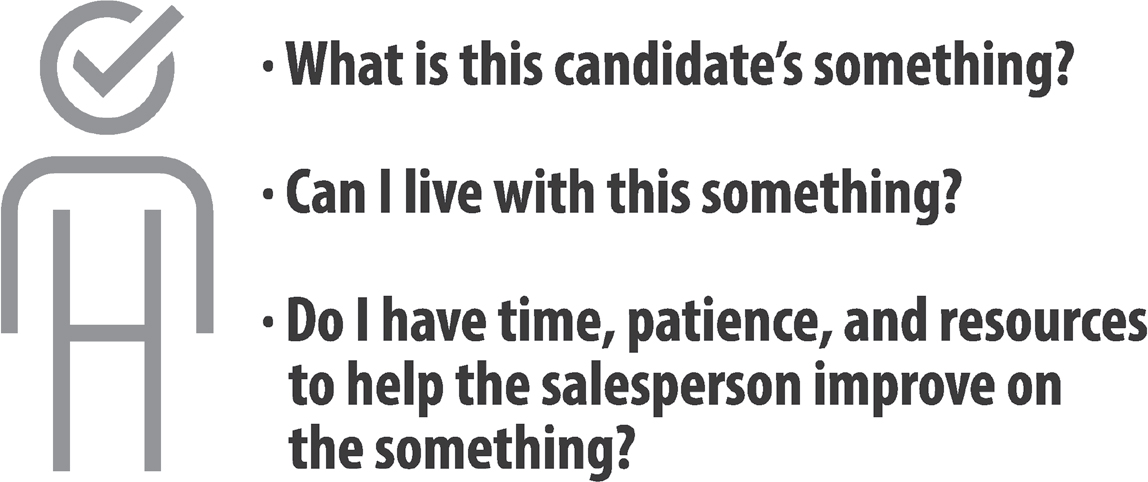OKAY, YOU’VE MADE THE decision that you are up for the challenge and reward of sales leadership. You recognize the skills needed to lead and direct a sales team are very different than those needed to be a great salesperson. Sales leadership requires skills such as training and coaching, giving feedback, accountability, and running effective sales meetings. We’ll get more into these skills in future chapters, but first let’s talk about one more sales management skill you will need to master. Without this skill, the rest doesn’t matter.
Learn how to hire great salespeople. It’s the difference between hell and happiness in sales leadership. The golden rule in hiring is, “Past behavior is the best predictor of future sales results.” It’s a great rule to live by. Another rule: interview and hire for emotional intelligence.
When conducting our sales management hiring workshops, I open up with a fun exercise called, “Your worst sales hire.” See Figure 3.1 for what bad hire stories usually include.

FIGURE 3.1
This exercise creates an “ah-hah” moment because 90 percent of what participants share has nothing to do with selling skills. Failure to launch and culture misfits stem from lack of soft skills, emotional intelligence skills.
Sales EQ and Sales IQ
When we help sales organizations improve their hiring processes, we find that many are focused only on qualifying candidates for the hard skills, the Sales IQ competencies. These competencies range from number of years in sales to specific industry experience to size of deals that the salesperson closed. These criteria are very important—so don’t eliminate these competencies in your selection process.
Equally important is interviewing and testing for emotional intelligence skills, Sales EQ. If you’re serious about creating great sales teams, great sales cultures, get serious about interviewing and eliminating candidates who are not a good culture fit. Get serious about hiring salespeople with emotional intelligence.
You’ve all heard the phrase “One bad apple spoils the bunch.” This isn’t just a cute phrase. Research shows that people will catch and carry the mood of other human beings. It’s called emotional contagion. If you hire a whiner, excuse-maker, a poor team player, you’ve just infused a negative virus into your sales culture, one that spreads rapidly.
The Bad Apple
When I was in my twenties, I was a buyer for a chain of stores located in Nebraska. We had a good team environment until a woman I will call Beth joined the company. In the beginning, she seemed like a lot of fun. But slowly, she started complaining about everything. She complained about our boss, company policies, travel requirements. And pretty soon, I am sorry to say, the rest of us joined in her sad chorus. Workdays were filled with complaints rather than our former good energy and humor. The focus slowly turned to everything we lacked rather than all the good things the company had in place. Internal bickering started because negativity breeds negativity. Looking back, I wish I had the emotional intelligence skills to recognize that I was catching a virus, one of complaining and whining. One bad sales apple can indeed spoil a good culture.
It’s Draft Day
My husband and I love watching movies. We get absorbed in great movie plots that provide escape and entertainment. Often, when watching movies, I see overarching themes that can be applied to sales and sales management success. I know . . . not proud of this behavior but it’s kind of the way my brain is wired.
Draft Day is a movie that I recommend to all my sales managers who want to improve their hiring practices. Kevin Costner plays the character of Sonny Weaver, who is the fictional general manager of the Cleveland Browns. The plot revolves around what to do after his team acquires the number one draft pick in the upcoming National Football League draft. Everyone should be happy, right? Instead, the plot takes a turn when Weaver assigns his coaching team to find the “something” this talented quarterback doesn’t possess. Sonny shares his recruiting philosophy with his coaching staff. “Everyone has ‘something’ missing, ‘something’ to work on. I need you to find this recruit’s ‘something’ because I need to figure out if I can live with it or not.”
Sonny Weaver was applying the EQ skill of reality testing, which is the ability to see things for what they are rather than what you’d like them to be. How many of you have made the mistake of falling in love with your candidate so you stopped searching for that “something?” Your love affair with a candidate causes you to shortcut the hiring process.
Sonny’s mindset, searching for “something,” is a best practice that all sales managers should adopt in their hiring practices. Sales leaders hire and work with human beings. The last time I checked, human beings are not perfect. They show up with flaws and blind spots. When interviewing candidates, continue to ask yourself the three questions in Figure 3.2.

FIGURE 3.2
Get Clear on Your Nonnegotiables
Dave Ramsey is the CEO of a multimillion-dollar company, radio show host, and author of EntreLeadership. In his book, he shares his twelve steps to making a good hire. He encourages readers to get very clear on their core values, their nonnegotiables. One of his company’s nonnegotiables is a huge work ethic. To paraphrase Dave, “Lazy is not a personality style. It’s a character flaw.”
Think about how hiring people with a huge work ethic might be challenged in today’s business environment. Most companies seem to hide the desire for a strong work ethic. Their recruiting ads are full of promises of beer Friday and ping-pong tables. No wonder they attract salespeople who come in late and leave early. The salesperson thought she was interviewing for a position at a laid-back spa, not at a company where big work ethic is expected and rewarded.
Tony Dungy, former NFL Super Bowl coach, was very clear on his nonnegotiables. In his book The One Year Uncommon Life Daily Challenge, he talks about the evaluation process of new prospects while he was the coach of the Indianapolis Colts. They might have a player with plenty of experience, talent, and skills—all the hard athletic skills that looked like they were a perfect fit for the team. Even with all these marvelous qualifications, a candidate might be dismissed if he had DNDC written next to his name on the evaluation form. Do Not Draft (because of) Character. Tony and his staff were clear on their nonnegotiables. The soft skills of character were just as important to Coach Dungy as the hard skills of playing great football. He and his staff were clear on their one thing and would not recruit a player who demonstrated lack of integrity.
When we create hiring playbooks, we press clients to identify their nonnegotiables. Getting clear on your nonnegotiables requires self-awareness and introspection. We’ve all been raised to be nice people. And nice people are taught to give other people the benefit of the doubt. This type of thinking often leads to sales managers making poor decisions and not standing firm on disqualifying candidates who don’t pass their nonnegotiables test.
Sales leaders, this is your sales organization. Get clear about what’s important to you. You may think you’re being nice. But if you are like me, my nice side quickly disappears when a salesperson breaches a nonnegotiable. It’s not the salesperson’s fault. It’s mine because I didn’t honor what’s important to me in the hiring process.
Each sales organization’s nonnegotiables vary because every sales organization has a different set of driving values, a different set of competencies needed to drive success at the life cycle of their company. Sales managers have different leadership styles, which create different “somethings” that are important to them.
Apply self-awareness and reality testing. Get clear on your nonnegotiables. Get clear on what you will or will not accept in a sales candidate.
Red Flags, Fires, and Self-Awareness
Sales managers miss “something” because they ignore “something.” Anyone besides me been guilty of ignoring a red flag? After you hire the salesperson, the red flag turns into a big fire!
Time to apply the EQ skill of self-awareness. That which you are not aware of you cannot change. In reflecting on some of my hiring mistakes, I’ve recognized red flags that were ignored for a variety of reasons:
• Exhaustion. I was overwhelmed and needed help. I’d already invested my limited time identifying, interviewing, and calling references. When a red flag appeared, I didn’t want to start over.
• I didn’t follow my own advice. My salespeople pipeline was empty so I settled for a warm body, anybody!
• Love. It’s easy to fall in love with a charming candidate’s personality. This love affair leads to rationalizing or glossing over nonnegotiables. One of my nonnegotiables is learning and hiring learners. I remember hiring a very charming salesperson. During the interview, I asked him a question about the last business book he’d read. He smiled and said, “Well, I’m going to get an F on that answer. I’ve been so busy selling, I haven’t had time to read.” I accepted and rationalized his answer. Of course, he’s selling and closing business! Now that he’s working for a sales education firm, he will change his ways! He didn’t. If you tend to fall in love easily, include someone in your hiring process who doesn’t! An analytical person can be a great asset in hiring because of their ability to look for data in the answers exchanged in a live interview.
• Logic over intuition. You’ve got a nagging feeling about a candidate; however, you can’t really put a finger on what’s making you uncomfortable. Since there is no evidence, some sales managers feel uncomfortable disqualifying a candidate. They want to be fair in the selection process. Take some advice from a colleague of mine who is a psychologist: “Don’t wait for evidence to honor your intuition.”
My colleague Beth Smith, author of Why Can’t I Hire Good People, shares a great analogy that illustrates the problem of ignoring “something”:
It’s similar to getting a small pebble in your shoe. Initially, it’s not too bad, however, after a few hours of walking with that pebble in your shoe, it becomes irritating. After a few days, it feels like a rock and really hurts. The same happens when you hire the wrong person. What starts out as a small irritation ends up being a big rock in your shoe.
What pebbles and red flags have you ignored?
Remember, the difference between hell and happiness in sales management is getting the right people on your sales bus. Get clear on your “something.” Don’t ignore the red flags that turn into fires. Apply self-awareness and look at your blind spots when hiring.
EQ Action Steps for Sales Leaders
1. Review your current hiring processes and examine your interview questions. Are you vetting potential candidates for emotional intelligence skills (Sales EQ) and consultative selling skills (Sales IQ)?
2. Identify your nonnegotiables. Design interview questions to specifically uncover whether or not your candidates possess these traits.
3. Analyze previous poor hires to determine what red flags you ignored during the hiring process. Ask yourself the tough questions on why you ignored these red flags. That which you are not aware of you are bound to repeat.